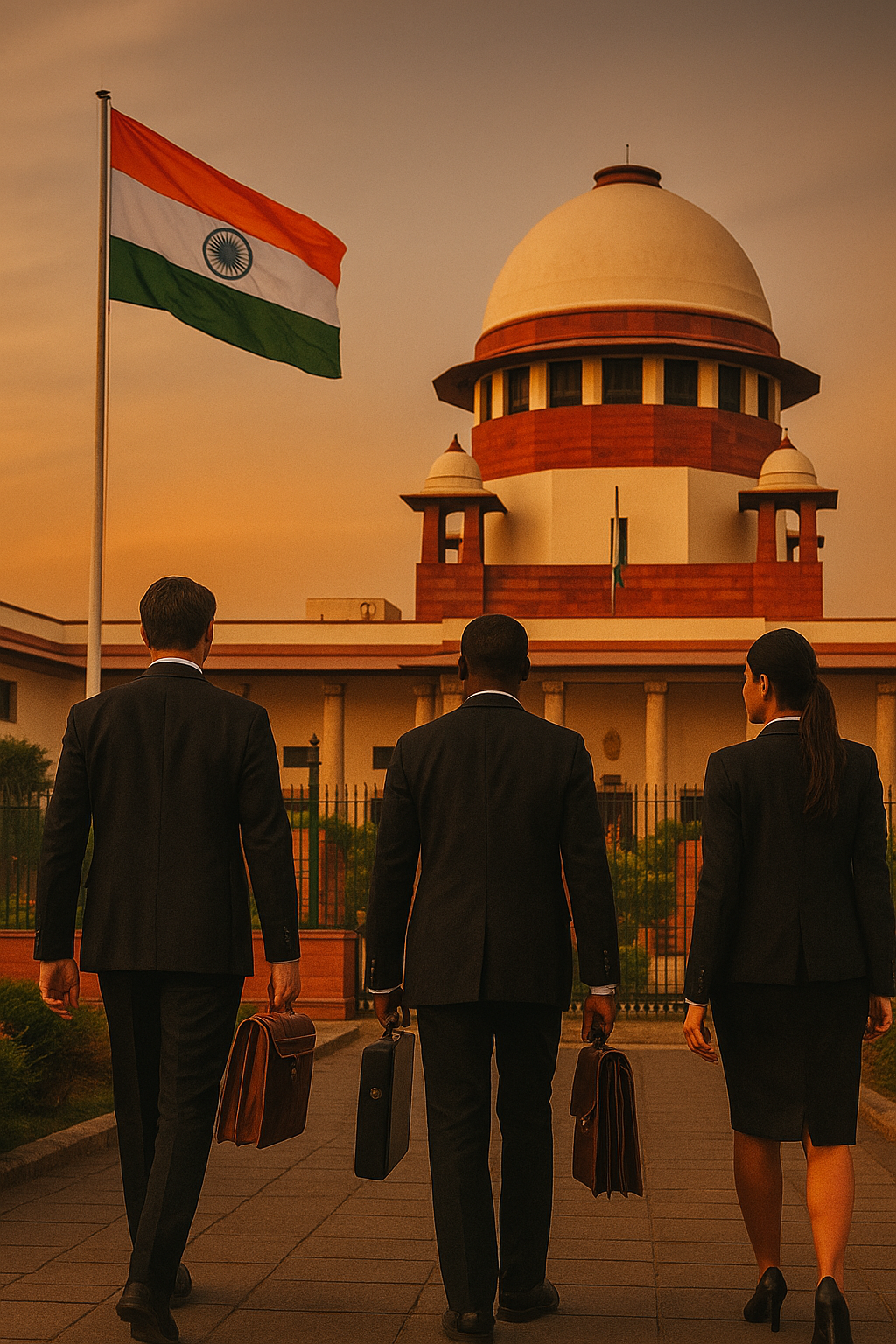Introduction
The BCI (Bar Council of India) in a landmark development, has officially amended its rules to allow foreign lawyers and foreign law firms to practice foreign law in India, provided such practice is non-litigious in nature and reciprocated by the foreign jurisdiction. The notification, issued in May 2025, marks a historic shift in India’s legal regulatory regime, potentially transforming its international legal services landscape.
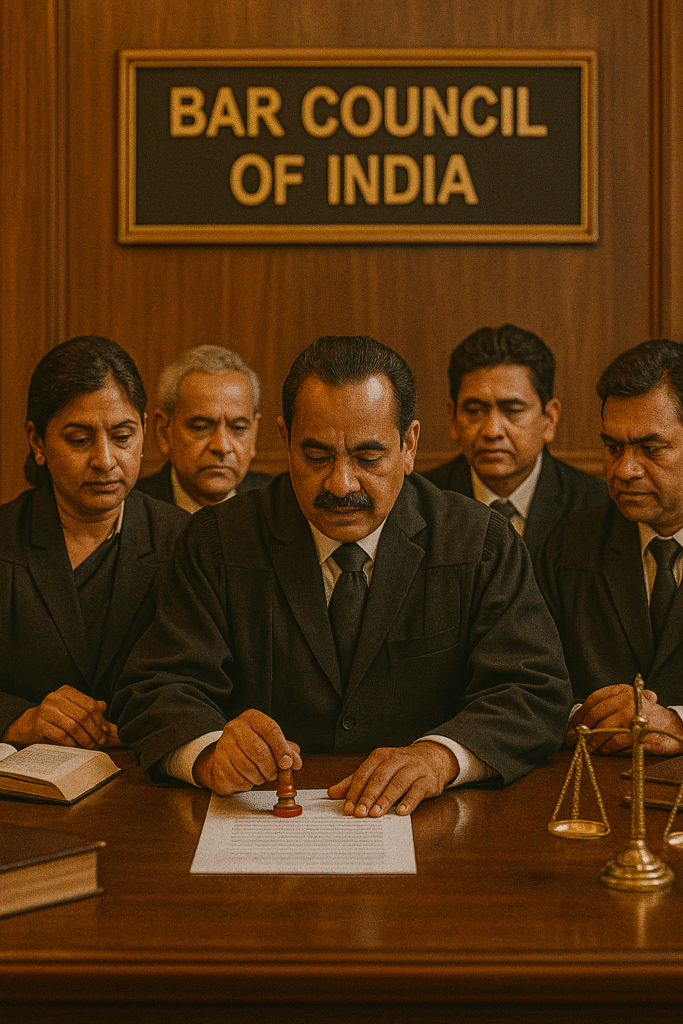
But what exactly do these amendments mean? Can foreign lawyers now appear in Indian courts? What is “non-litigious” practice? Does this amendment benefit or harm Indian legal professionals? This blog breaks down the legal, regulatory, and international implications of the BCI’s decision.
Background: Why This Rule Change Matters
Until now, India maintained a closed legal market. Foreign lawyers and law firms were barred from opening offices or practicing law in India. This position was upheld by the Supreme Court in Bar Council of India v. A.K. Balaji (2018), where the Court ruled that while occasional “fly-in and fly-out” advice on foreign law was permissible, a permanent or regular presence required express authorization.
The current amendments signal a regulatory liberalization, aligning India with global trade and legal service commitments. The BCI had issued a consultation paper in 2022 inviting public comments, and now, in 2025, it has notified operational changes under its rule-making powers.
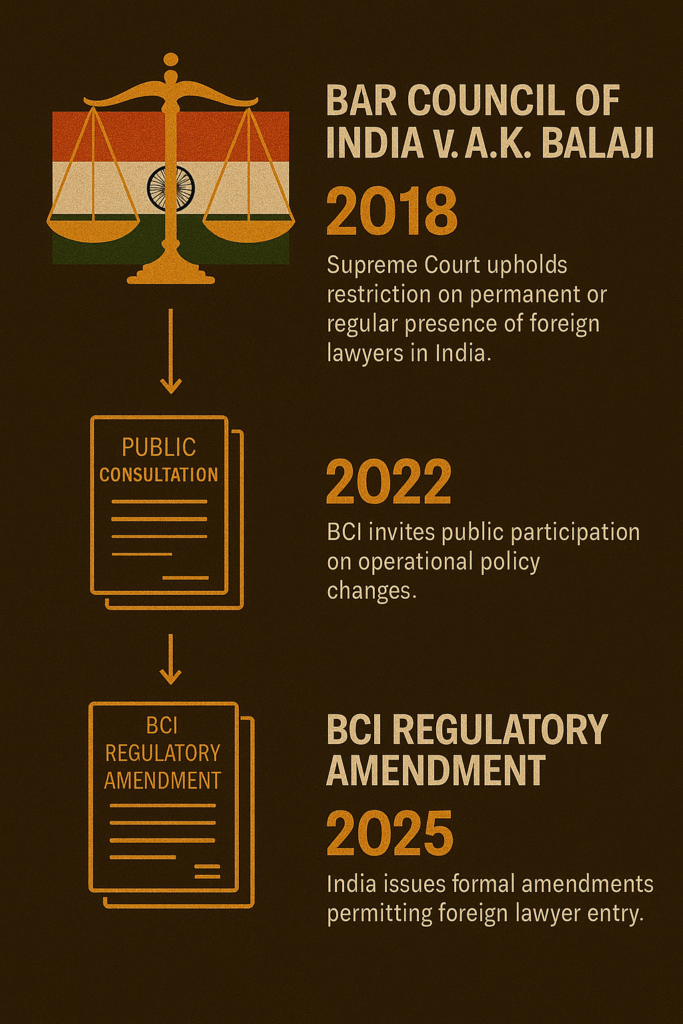
What the BCI Amendment Says
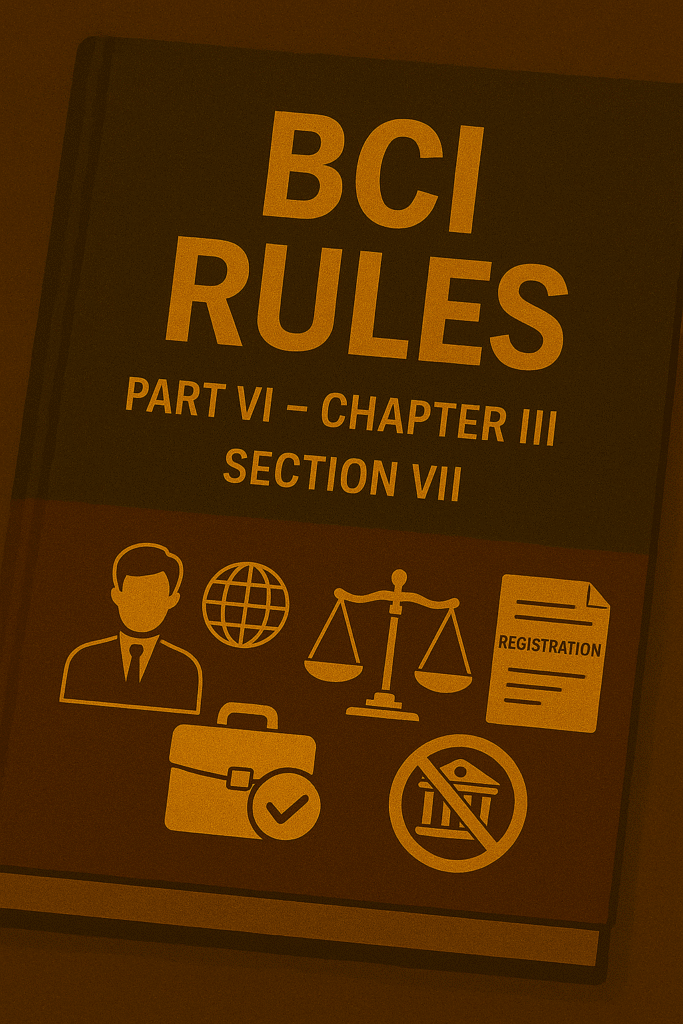
The amendment introduces provisions under BCI Rules, Part VI, Chapter III, Section VII, permitting:
- Foreign lawyers and law firms to practice foreign law in India without engaging in litigation;
- Such practice is subject to reciprocity, i.e., Indian lawyers must be similarly allowed to practice in the foreign jurisdiction;
- Practice areas are limited to transactional work, international arbitration, contract drafting, M&A advisory, and IPR consultation, among others;
- Mandatory registration with the BCI, annual renewals, and adherence to Indian ethical and professional standards;
- Prohibition on appearing before courts, tribunals, or statutory authorities in India.
What is ‘Non-Litigious Practice’?
The rules define “non-litigious” as services not involving court appearances, including:
- Drafting contracts and commercial agreements governed by foreign law;
- Advising on cross-border mergers, taxation, and joint ventures;
- Participating in international arbitration seated in India (subject to conditions);
- Advisory work in multinational disputes or regulatory compliance.
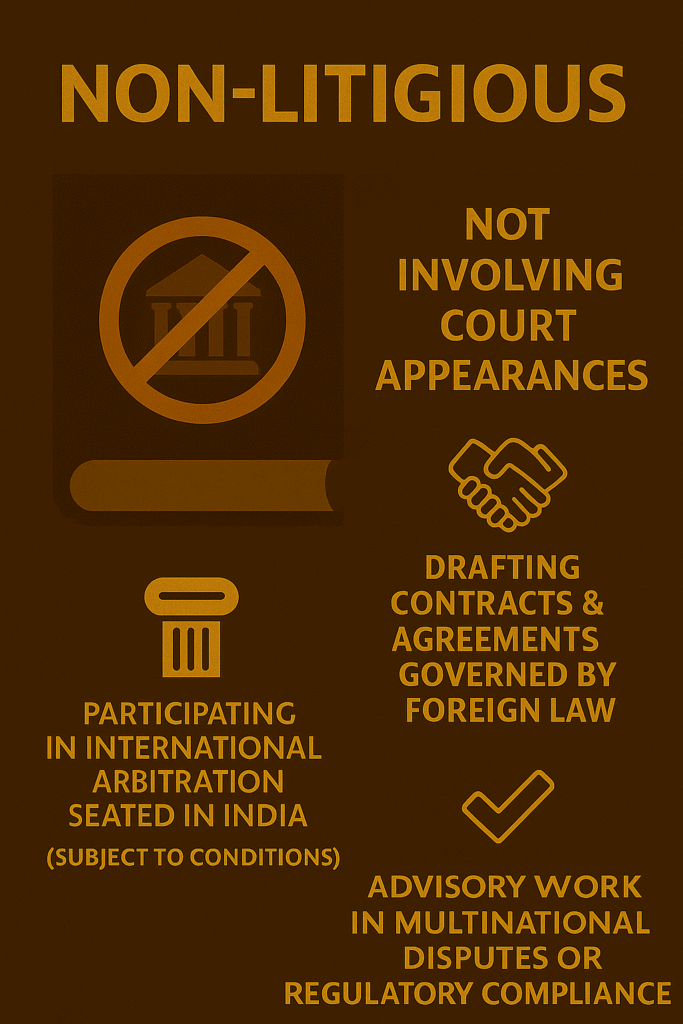
This ensures that Indian litigation remains reserved for Indian advocates, while multinational clients seeking foreign law advice in India gain regulated access to international firms.
Reciprocity Clause: A Key Legal Filter
The principle of reciprocity is central. Only those foreign lawyers/law firms whose home countries allow Indian lawyers a similar right to practice will be eligible. This raises complex questions of interpretation:
- What qualifies as adequate reciprocity?
- Does partial access (e.g., contract law but not arbitration) suffice?
- Who evaluates the reciprocity—BCI or MEA?
These ambiguities could become litigation points or policy flashpoints in the future.
Judicial Context: A.K. Balaji Judgment
In *A.K. Balaji v. Union of India* (2018) 5 SCC 379, the Supreme Court ruled:
“Foreign law firms cannot set up offices in India or practice Indian law. However, they may render advisory services on a ‘fly-in, fly-out’ basis subject to Indian law.”
The current amendment complements rather than contradicts this judgment. The BCI has created a regulated mechanism for foreign law practice—something the Court had left open-ended.
Impact on the Indian Legal Ecosystem
The reaction will likely be mixed:
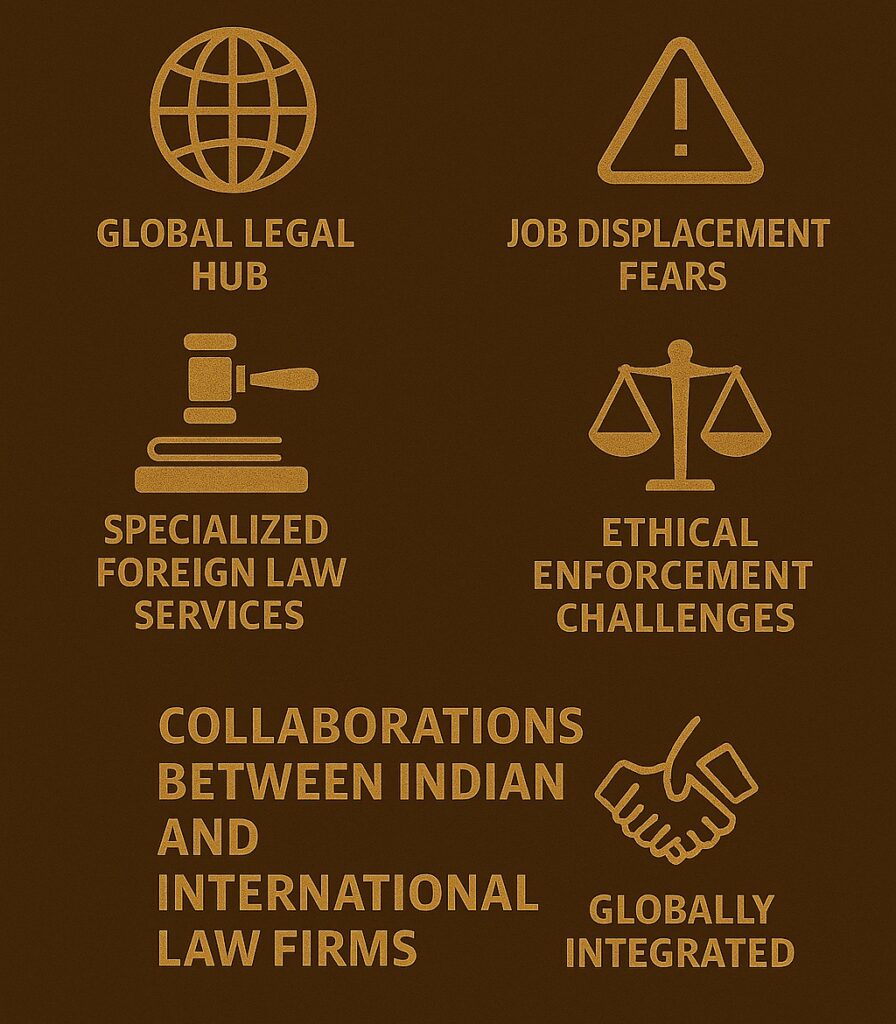
Potential Benefits
- Boosts India’s credibility as a global legal hub, especially in international arbitration;
- Clients gain access to specialized foreign law services within India;
- Promotes collaborations between Indian and international law firms;
- Legal education may become more globally integrated.
Concerns
- Job displacement fears among young Indian lawyers;
- Unequal bargaining power between international and domestic firms;
- Ethical enforcement challenges across jurisdictions.
To balance interests, the BCI has clarified that foreign firms cannot practice Indian law and must comply with disciplinary rules and fee restrictions.
How India Compares Globally
Many countries already permit regulated entry of foreign lawyers:
- Singapore licenses foreign law practices and permits joint ventures with local firms.
- Source
- United Kingdom allows registered foreign lawyers to practice certain areas of law. Source
- United States permits temporary foreign legal practice under Model Rule 5.5 and state-specific reciprocity rules. Source
India’s model appears conservative yet adaptive, prioritizing sovereignty and gradual integration.
Conclusion: A Calculated Opening, Not a Free Pass
The BCI’s 2025 amendment marks a turning point in India’s legal globalization journey. While it does not open Indian litigation to foreign actors, it creates controlled entry points for cross-border legal practice. The real impact will unfold in implementation—especially how the BCI interprets reciprocity, disciplines misconduct, and supports Indian firms in an evolving legal economy.
For now, this is a strategic signal to the world: India is ready to engage—but on its own terms.
Further Reading (Existing Blogs)
- Supreme Court Declares Digital Access a Fundamental Right
- Where to Incorporate Your Startup in 2025: A Global Legal Guide for Founders
Upcoming Blogs
- Can India Criminalize Marital Rape in 2025? Legal Status & Constitutional Questions
- Will India Regulate ChatGPT and AI Tools? The Legal Vacuum in AI Governance
Need Legal Insight or Compliance Guidance?
At LexNova Consulting, we assist individuals, startups, and global businesses in navigating complex legal changes—including international legal licensing, Bar Council regulations, and compliance frameworks.
Have questions about how the BCI’s 2025 amendment could impact your firm or practice?
We’re here to help.
Contact us here to schedule a consultation or submit your query directly through our secure form.

